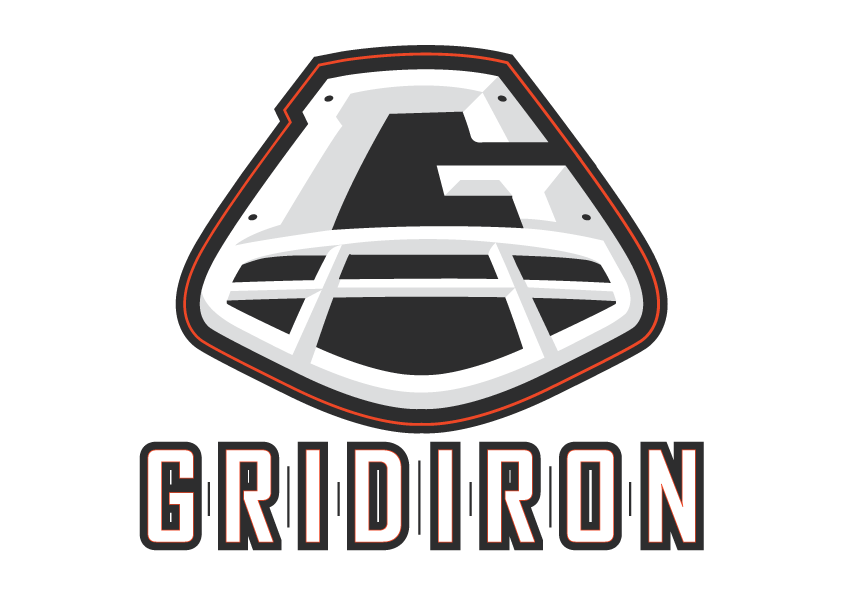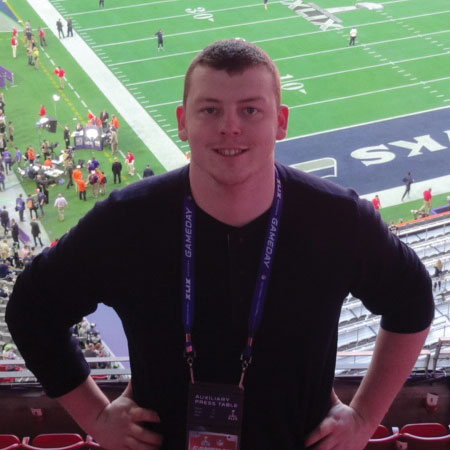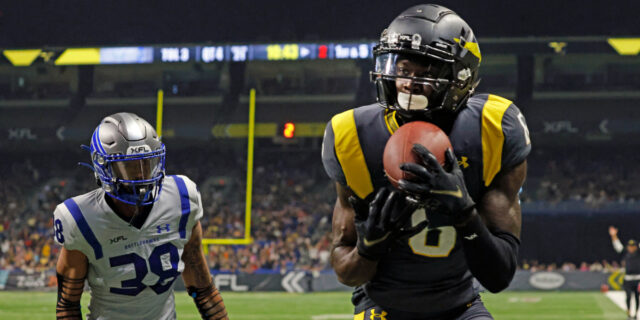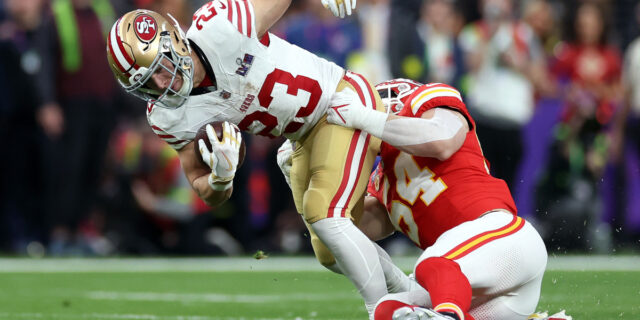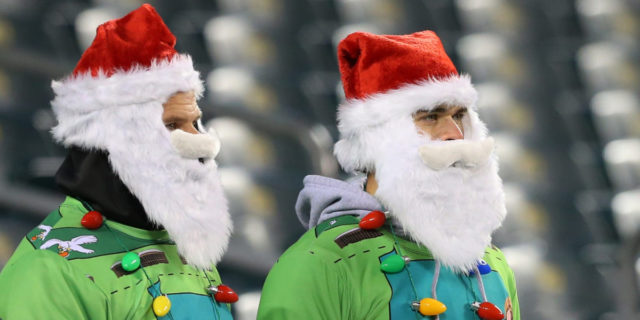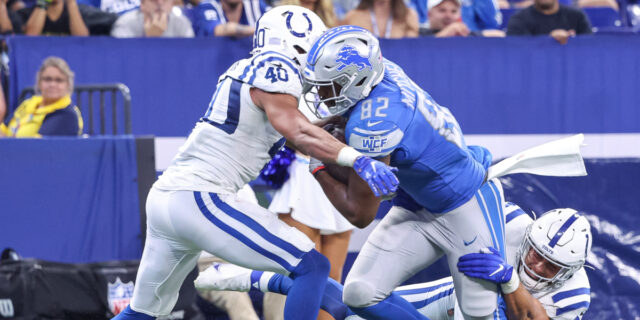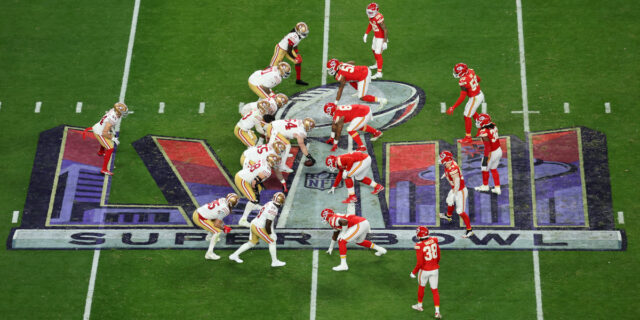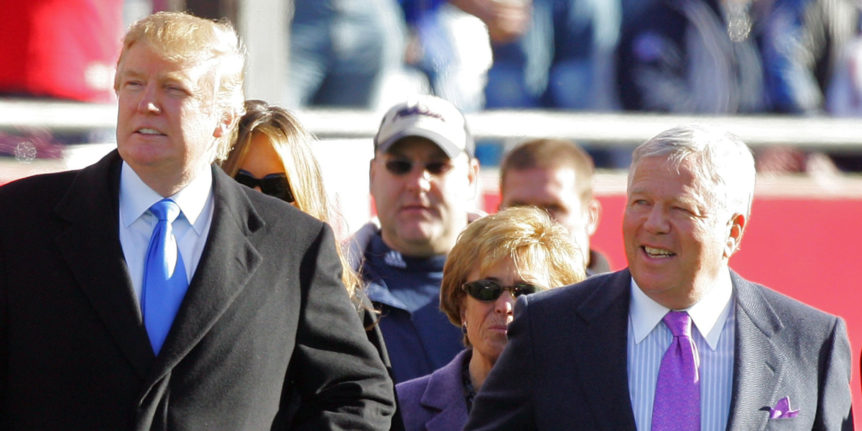
Trumped!
More than 30 years before he launched his bid for the White House, Donald Trump set his sights on bringing down the NFL using an upstart league which, prior to his arrival, was quietly minding its own business…
We don’t need to tell you how Trump’s campaign to become the 45th President of the United States and leader of the free world was forged, or how he ran roughshod over hundreds of years of convention, his crop of blonde hair ablaze above histrionic gestures and facial expressions, trampling all before him in his quest for attention, wealth and ultimate power. But, while his run for the White House was extraordinary in the way it overturned tradition, it’s nothing new.
Throughout his career, Trump has shown little remorse for those in his path. So it’ll come as no surprise to learn that back in the early to mid-eighties, Trump did the same to pro football. Aged 37 and with his trophy wife, Manhattan tower and millions of dollars, he bought the New Jersey Generals of the USFL and proceeded to destroy a budding football league with his relentless crusade for authority and revenue. “I’ll always feel that his personal ambitions sunk the league,” said film star and minority owner of the Tampa Bay Bandits, Burt Reynolds.
So how did Trump get involved with the USFL and bring it to its knees? Frankly, it was just how you’d expect – an all-everything entrance to create the illusion of ‘saviour-is-born’ before going all-in on his attempt to up-end the NFL by pushing his fellow owners to move games to the autumn in hopes of inciting a merger. The upstart spring league which launched in 1983 was everything the NFL wasn’t – fun, exciting, challenging with a spirit that the so-called ‘Big League’ couldn’t compete with. And it came about in part because of a perfect storm: the NFL strike season of 1982, the rise in cable television and the nationwide appetite for football.
The USFL was created by a New Orleans-based antiques dealer called David Duke, who got the idea from watching fans streaming to see local universities conduct spring practices at their home stadia. His thinking was simple: if people were going to watch college teams practice in the spring, why wouldn’t they watch professionals play games? Duke had a low-rent business model that many saw as foolproof: entertaining football played in selected markets with controlled economics. And so a league was born. But that model quickly went off the rails when the original owner of the New Jersey Generals struck a major coup by signing Heisman Trophy winning RB Herschel Walker for a small fortune as a junior from the University of Georgia. “A bunch of guys had a few beers and decided to form this league,” said Jay Walter Duncan. “And I had one too many and signed Herschel.”
It’s hard to underestimate, even now, the legitimacy that one deal gave to the USFL. And how crucial it was to the league’s demise, far more so than any of the other stars the league signed, including fellow Heisman winners Mike Rozier and Doug Flutie, and future NFL Hall of Famers Steve Young, Reggie White, Jim Kelly and Gary Zimmerman – who were all picked clean from under the NFL’s collective noses.
ABC Television signed a contract to nationally televise games using their new cable channel ESPN and the USFL placed franchises in major markets – NY/NJ, LA, Chicago, the Bay Area, Philadelphia and Boston – along with mid-sized media cities like Tampa and Arizona. The inaugural season began on March 6, 1983 with five games, including Walker’s professional debut. TV audiences were good and, while not sold out, attendances healthy. The real-estate mogul Ron Blanding, who owned the Denver Gold, was so confident of the product that he offered fans refunds after the first quarter of the first game. Very few took him up on it and the Gold ended up leading the league in attendance. They were also the only franchise who ended the season in the black.
Most had overspent on roster talent and, although there was plenty of red ink to go around in the league’s income statements and several owners wanted out, that ‘83 season was deemed a success. No franchises had gone bust and there was steady optimism in the league offices that 1984’s campaign would build on what had gone before. “Spirits were high after one season,” reflected league Commissioner Chet Simmons. “We thought we might just have something. And then came the game-changer: Donald Trump.”
He’d come to prominence in the mid-70s, a brash suit from the outer boroughs bent on placing his imprint on the island of Manhattan. Trump exhibited a flair for self-promotion, grandiose schemes and, perhaps not surprisingly, provoking fury. New York’s realtor titans scoffed, believing his braggadocio was the sum of the man who spent much of his time in the company of fashion models. He’d long aspired to buy an NFL team but couldn’t get his hands on one, despite pushing hard to buy the Baltimore Colts only to be told he was “wasting his time”. So instead he went for the next best thing: a franchise in the upstart USFL. Yet he didn’t love David Dixon’s product. Or even like it. According to super-agent Leigh Steinberg, Trump thought the USFL was “second rate”. But that didn’t stop him.
“He does everything big, whether it’s big buildings or a presidential candidacy,” said Jim Kelly. “He always shoots for the stars and usually gets what he wants. Except the NFL.”
In September 1983, Trump bought the New Jersey Generals from Walter Duncan, who’d lost more than $3 million in the league’s first season and had told friends that “being a football owner hadn’t proven to be as much fun as he’d imagined”. He’d also been seen in something of an unfavourable light following the signing of Walker, which had stirred a furore in college football.
For Trump, however, Walker was perfect: the biggest, most glamorous name in all of professional football played for him and he made no attempt to hide his feelings. “Herschel is our ace in the hole,” he told reporters. “I’ll be seeking his advice on football decisions, including who the next coach should be.” The incumbent coach, Chuck Fairbanks, was quickly dismissed and Trump sought a big-time replacement that would make another statement while delivering a body shot to the NFL.
That man was Don Shula of the Miami Dolphins. “I talked by telephone with Shula but made no offer. He sounded like a nice guy,” Trump said. “It’s a matter of dollars. I think I can have anyone. I didn’t become successful just by throwing money around.” Rumours abounded that Shula had been offered a million a year, more than double what any NFL coach was then being paid and, with Shula’s contract up in Miami at the start of 1984, it looked like a marriage made in heaven.
In the end, the talks broke down with Shula citing them as a “huge distraction”. Trump, on the other hand, went on the offensive: “It was just too time consuming. He requested an apartment in Trump Tower, and I lost my enthusiasm to continue forward when that was mentioned. That’s more than money, more than salary, that’s gold.” Shula stayed in Miami with a rookie passer called Dan Marino while Trump settled instead for the former New York Jets coach Walt Michaels and turned his attentions back to goading the NFL.
“In two or three years, we’ll achieve parity with them. In fact, in my opinion, some USFL teams could beat NFL teams right now.” Nobody knows if that was true. But one of those teams may well have been Trump’s Generals, who came into that 1984 season with renewed optimism after a miserable first campaign. But ‘84 was to be more difficult – the league had expanded from 12 teams to 18 and one man had an idea that would become a mission, something that tore at the very heart of the USFL’s USP: moving the league from the spring to the autumn.
“If God wanted football in the spring, he wouldn’t have created baseball,” Trump famously said. This stance put him at odds with much of the league, but many of the owners, while privately expressing doubt over any move, wanted to keep making money and so, publicly, were in thrall to Trump. Steve Erhardt was the USFL’s Executive Director: “There’s no question everybody appreciated him coming into the league. Everybody really respected what he was doing in that second year. But what caused tension was he began pushing the tape, saying we needed to be playing in the fall. Some of the other owners in different markets said we had to stay in the spring, that they had too much power in the NFL.”
One of those owners was quickly becoming Trump’s arch nemesis. John Bassett of the Tampa Bay Bandits was everything Trump wasn’t: fiercely loyal, adored by players and the Bandits’ fans – and in love with the USFL. The Bandits were America’s (spring) Team and ‘Banditball’ was a mania that took the country by storm. Bassett stood up to Trump. His team were, in the words of author Jeff Pearlman, “the model franchise when it came to professionalism, class, and fan inclusiveness. He thought any move to play in direct competition with the NFL would trigger an apocalypse.”
Attendances and television figures started to fall as the product became stretched. More teams meant more average players and fans started to turn off as Trump turned up the pressure of change, despite Bassett’s best efforts. “John was always logical because that was his background,” said USFL Commissioner Chet Simmons. “Unfortunately Trump was illogical. John’s business model was to stay in the spring, build the audience, build the fan base and build a financially sound sports league.”
Part of that plan, two decades before the International Series, was to grow the game worldwide. He proposed a game between the Bandits and Trump’s Generals at Wembley in July 1984, six days after the USFL Championship Game. He also railed against the wastage of the league’s owners who were trying to spend their way out of debt. “I think the greatest problem the USFL faces is realistic financial management of franchises,” Bassett said in a TV interview. “I’m like John the Baptist running through the (league) meetings and I keep saying to everyone ‘mind your costs’. But Donald didn’t want to listen to any of it.”
Bassett’s USFL apocalypse finally came home to roost in two stages. The first, in August of 1984, when Commissioner Simmons called a press conference to announce that Trump had won and that the USFL was moving to the autumn for its fourth season in 1986 with the ill-fated words: “We’re going to take the NFL on head-to-head.”
Veteran ABC broadcaster Keith Jackson, who did many of the USFL commentaries, was one of many who ridiculed Trump’s stance. “The very idea of taking on the NFL was one of the silliest things I’d ever heard, based solely on his greed and a lack of patience.” And the players weren’t thrilled either. “The declaration that we were moving to the fall was a hard thing to swallow,” said Young. “We knew that wouldn’t go too well.” And Kelly agreed: “We had a good thing going in the spring. But Trump… I’m sure he looks back and thinks it was a huge mistake.”
The second stage happened two summers later: having already lost more than $200 million, the USFL owners went ahead with a $1.7 billion anti-trust lawsuit against the NFL, who it claimed, among other things, had a stranglehold on TV rights. They hoped the suit would void the NFL’s TV contracts, force a merger, or provide a game-changing payday.
The 42-day trial ended with the jury ruling in favour of the USFL, but concluded that it had been its own worst enemy financially and so awarded them damages of a single dollar, tripled to $3 dollars and ending up finally at the princely sum of $3.76 after interest. Trump and the league appealed, cancelling its season in the process and essentially ending its three-year run.
No more passes would ever be thrown under the USFL banner. “The founding fathers, such as they were, had a pretty good idea,” said Charley Steiner, radio voice of the New Jersey Generals. “And when you have a guy come in and right away say, ‘If God wanted football in the spring, he wouldn’t have created baseball’… I’m like, ‘Why are you coming to this dance? Find another dance to crash’. He crashed our party pretty hard. Fortunately, it was only football.”
It was only football. And yet it was so much more. “I’ll always feel that it was his personal ambitions that sunk the league,” said Reynolds. The USFL’s demise played into the hands of the NFL, which saw a myriad of innovations and star players enter the league. But what had happened at the hands of Trump left a lot of people unhappy, a bitterness that still lingers today. “What Trump desired, what he craved, was attention. Imagine that,” said Steiner. “He felt that buying a football team, albeit the New Jersey Generals of the USFL, not the NFL, would get him into the greater media consciousness. It was a calculated media strategy. [He was] the best thing that ever happened to the USFL and, two years later, he was the worst thing that ever happened to the USFL.”
When interviewed in 2011 for an ESPN documentary about the role he played in the downfall of the league, Trump was his usual bombastic self. “You know, I don’t even think about the USFL anymore. We had a nice experience, it was fun, and we had a great lawsuit. I got the league to go as far as it did. It would have folded way before were it not for me.”
Herschel Walker and, to a lesser extent the USFL, gave Trump what he craved: notoriety and the opportunity to increase his brand, his power and his wealth. Football was totally peripheral to that; he knew very little of the game. For Trump, it was a power trip and the comparisons between his involvement in sport and politics are obvious, a point not lost on Charley Steiner. “You can cut and paste the USFL and the Republican Party of today and it’s the same damn story. It’s all about him and the brand and moving on to the next thing if it doesn’t work out.”
This article originally appeared in Issue XXVI of Gridiron magazine – for individual editions or subscriptions, click HERE
